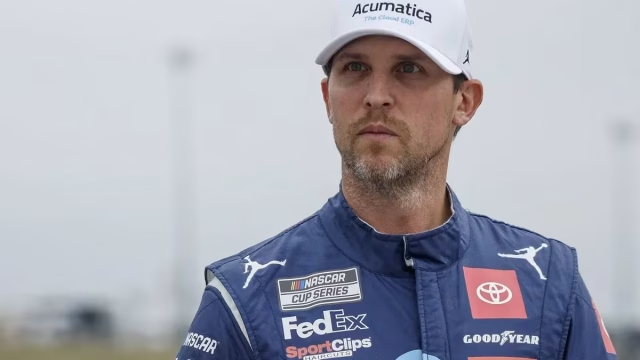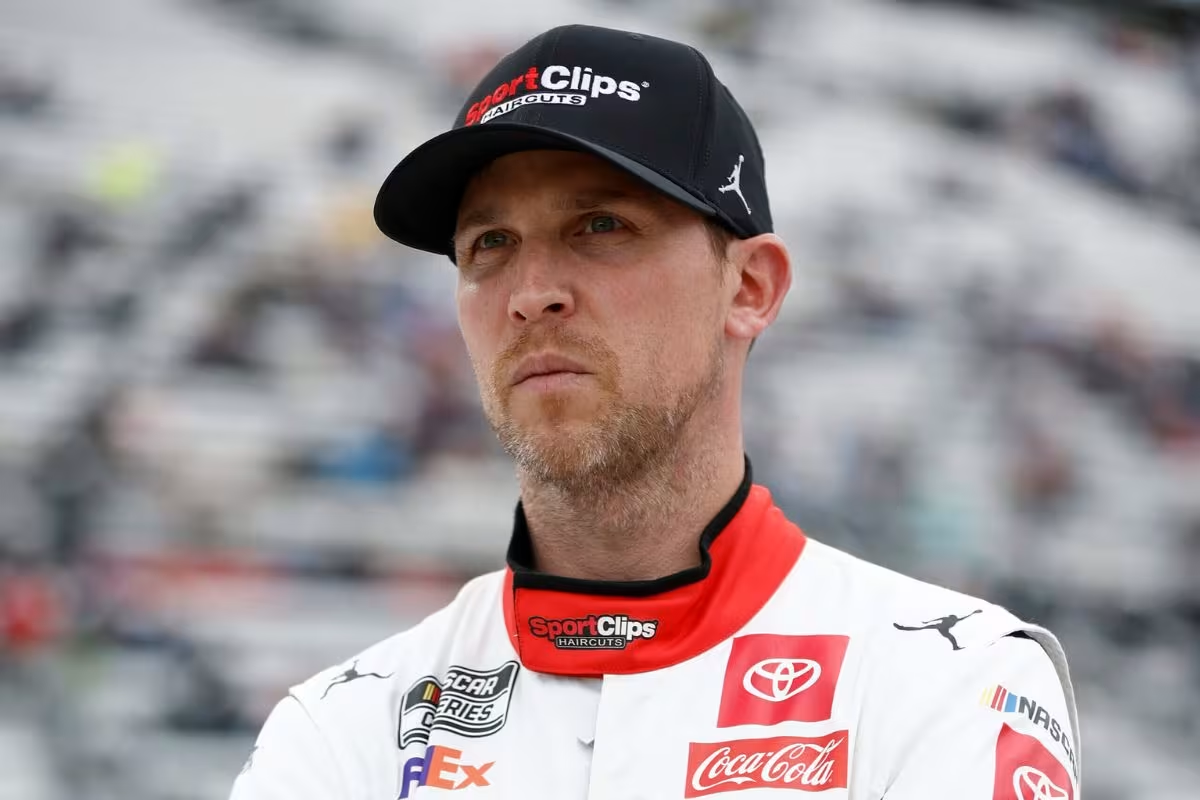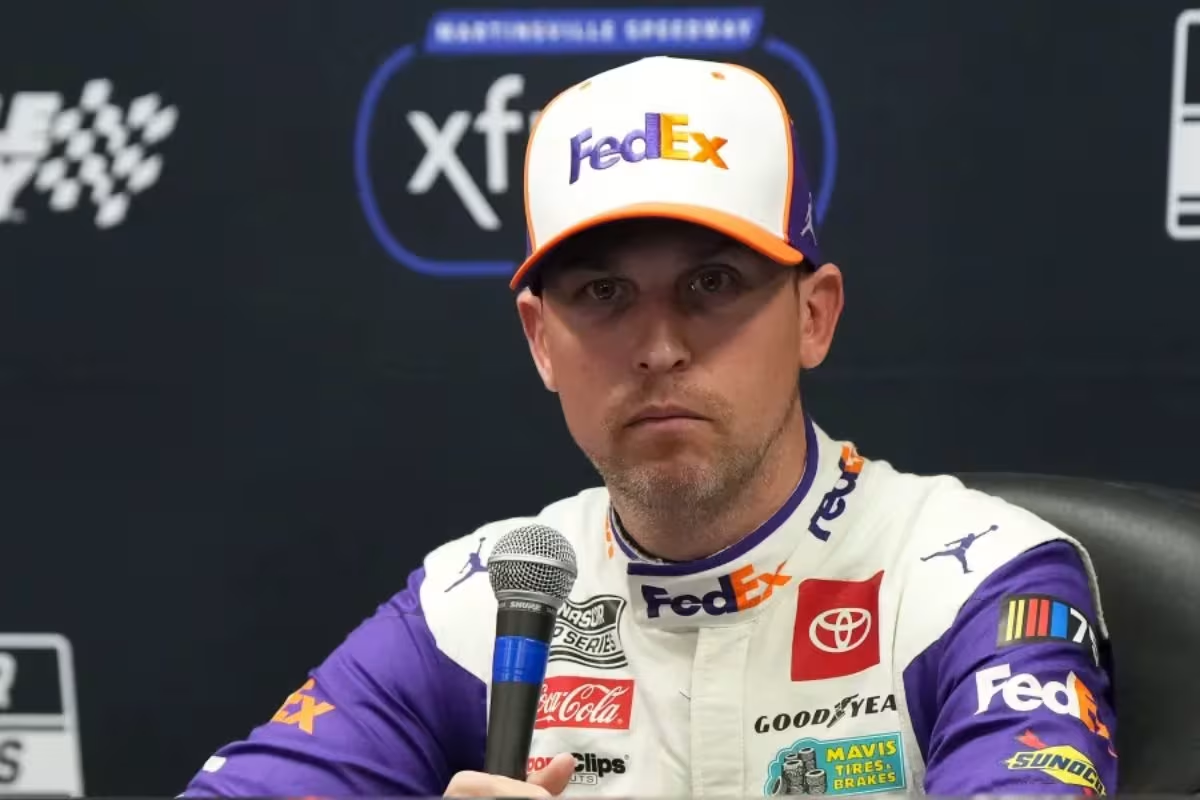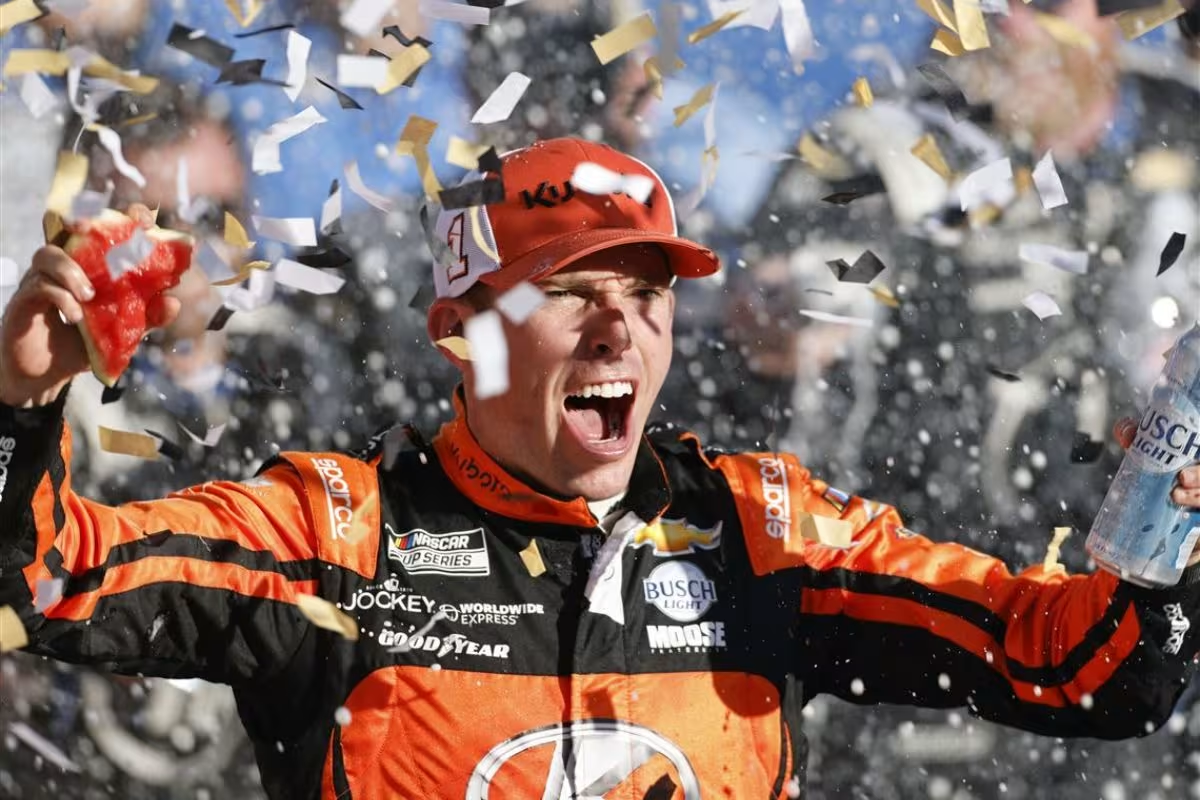Denny Hamlin Slams NASCAR Playoff System: Denny Hamlin‘s recent critique of NASCAR’s playoff system raises substantial questions about the integrity of competitive racing in the sport. By asserting that the current format may favor less aggressive strategies, Hamlin highlights a growing concern among drivers about the implications for those who prioritize performance over points. This tension between risk and reward impacts individual races and the overall competitive landscape of NASCAR.
Key Highlights
- Denny Hamlin criticizes NASCAR’s playoff system for perceived favoritism towards certain drivers, questioning its fairness and competitive integrity.
- He argues that the current structure influences driver performance and morale, hindering true competition among playoff contenders.
- Hamlin’s concerns reflect a growing sentiment among drivers about the need for reevaluation of playoff rules to ensure equitable racing.
- The emphasis on accumulating stage points under pressure leads to conservative strategies, limiting aggressive racing opportunities for competitive drivers.
- Non-playoff drivers, like Ross Chastain, benefit from the freedom to race aggressively, highlighting a disparity in competitive dynamics during playoffs.
Denny Hamlin’s Missed Opportunity at Kansas Speedway
Denny Hamlin’s performance at the Kansas Speedway, a NASCAR racetrack, during the 2024 Hollywood Casino 400 represented a missed opportunity for the seasoned driver, who entered the race with a competitive edge. With the fastest car on the track, expectations were high for Hamlin, especially considering his experience and prior successes at similar venues. However, the culmination of strategy missteps, pit road issues, and untimely cautions ultimately diminished his potential to secure a much-needed victory.
Strategically, Hamlin’s team appeared to falter, reminiscent of their approach in the opening playoff race. Essential decisions regarding tire management and pit timing failed to align with the dynamic race conditions. This oversight not only cost him track position but also compromised his ability to capitalize on the car’s inherent speed.
In addition, Hamlin’s struggles in the pit lane added another layer of complexity, as any inefficiency there can greatly derail a driver’s momentum in a playoff context.
As he finished eighth, the consequences of this race extend beyond mere statistics, placing Hamlin in a precarious position as the playoffs progress. The lack of a victory since Dover in April amplifies the urgency of his situation, as each race becomes increasingly vital.
Pressure on Drivers in Playoffs, According to Hamlin
Amid the environment of NASCAR’s playoffs, the pressure on drivers intensifies dramatically, as highlighted by Denny Hamlin in a recent episode of the Actions Detrimental podcast. Hamlin pointed to Ross Chastain’s unexpected victory at Kansas racetrack as an example of how the competitive landscape can shift under the immense strain of the playoff system. The stakes are undeniably heightened, transforming each race into a pressure cooker where every decision can have monumental consequences.
The mental burden faced by drivers cannot be overstated. With championship aspirations on the line, the fear of making mistakes looms large, often influencing tactical choices during races. Hamlin’s insights reflect a broader concern about how this pressure might skew competitive fairness, pushing drivers to adopt conservative tactics rather than race to their fullest potential.
Hamlin Highlights Conservative Strategy for Playoff Drivers
As the playoffs unfold, the tactical maneuvers of drivers competing for the championship become increasingly calculated. For playoff contenders, the approach employed is often characterized as ‘conservative,’ emphasizing the accumulation of stage points rather than pursuing outright race victories. This shift in focus reflects the heightened stakes, where each decision made can profoundly impact the long-term quest for the championship.
Denny Hamlin astutely observes that non-playoff drivers, like Ross Chastain, possess a distinct advantage in this environment. With no pressure to accumulate points, they are free to adopt a more aggressive racing style, often leading to riskier maneuvers that can yield considerable rewards. In contrast, playoff drivers are compelled to prioritize consistency and tactical scoring.
Hamlin articulated this dynamic during an episode of the Actions Detrimental podcast, noting, “That’s the advantage the non-playoff drivers will have is that they don’t care about the stage points.”
“That’s the advantage the non-playoff drivers will have is that they don’t care about the stage points. You’re going to see us at the Roval and all these racetracks selling out for stage points.” – hamlin
The playoffs can be likened to a marathon rather than a sprint; while individual races may offer opportunities for automatic advancement through victories, the overarching goal for playoff contenders is to maintain their championship viability across multiple events. This necessitates a long-term approach, where securing stage points becomes vital.
Consequently, playoff drivers must navigate a fine line between aggression and caution, recognizing that a single miscalculation could jeopardize their title aspirations. In this high-stakes environment, the tactical choices made by playoff drivers reveal the intricate dynamics of NASCAR’s playoff system.
Hamlin’s Playoff Strategy and Previous Criticism
The tactical choices made by playoff drivers often come under intense analysis, particularly when those decisions do not yield favorable outcomes. Denny Hamlin’s strategy during the Quaker State 400 at Atlanta Motor Speedway exemplifies this analysis. Hamlin, starting the race in a compromised position, opted for a conservative approach, hoping to benefit from potential wrecks and cautions. This decision, however, led to a disappointing 24th place finish, complicating his advancement through the playoffs.
Hamlin’s sentiments resonate with Kyle Larson, who remarked on the prevalent conservatism among playoff drivers. The implications are clear: while securing stage points can be advantageous, it can also prove detrimental, especially on tracks like the Charlotte Roval racetrack, where overtaking is notoriously challenging.
“What happens is all the cars that flip, they’re just going to end up in front, racing for the win. Not the playoff cars. And you heard it. Teams become more conservative in the playoffs. I know it’s the more unpopular opinion, but it’s totally true. Kyle Larson actually mentioned it on the Dirty Mo Live. At Kansas, we were all out but he said, ‘I feel people just get more conservative during the playoffs’.” – hamlin
As the playoffs unfold, Hamlin’s approach and the broader implications of conservative strategies will continue to be a focal point of discussion. The tension between safety and risk-taking embodies the intricate dynamics of NASCAR’s playoff system, compounding the challenges faced by elite drivers aiming for championship glory.
Ross Chastain’s Win at Kansas
A notable milestone was achieved at the 2024 Hollywood Casino 400, where Ross Chastain broke his lengthy winless streak, securing victory at Kansas Speedway. This triumph not only marked a personal achievement for Chastain but also disrupted the playoff narrative, denying automatic qualification to any playoff driver.
With a resolute focus on pride rather than points, Chastain’s aggressive strategy reflected Denny Hamlin’s assertion that non-playoff drivers often adopt a higher risk appetite, ultimately leading to unexpected victories.
Chastain’s post-race enthusiasm was palpable as he remarked on the significance of the win for his Trackhouse Racing team. His victory serves as a demonstration of the resilience and ambition that characterize competitive racing.
“It’s a huge deal. For us on this No. 1 team, this is what Cup racing is all about. It’s what Justin Marks bought into Trackhouse with Pitbull, to do stuff like this. To disrupt. There’s been times this year when we couldn’t have disrupted [a] minnow pond outside of Darlington, let alone a Cup race. It’s hard. It’s really tough.” – ross
- The fierce determination of non-playoff drivers to challenge the status quo.
- The contrasting strategies between playoff and non-playoff teams, with the former often adopting a more conservative approach.
- Chastain’s victory igniting the competitive spirit among his peers, prompting them to pursue similar opportunities for glory.
Trackhouse Racing team’s expedition since its inception in 2021 has been remarkable, and Chastain’s victory at Kansas highlights the unpredictable nature of NASCAR’s competitive landscape.
As the season approaches its climax, this win serves as a rallying cry for non-playoff drivers, with six races remaining to stake their claim in Victory Lane.
News in Brief: Denny Hamlin Slams NASCAR Playoff System
The criticism levied by Denny Hamlin regarding NASCAR’s playoff system emphasizes considerable concerns within the racing community. By suggesting that the current format may favor certain drivers through conservative strategies, Hamlin highlights a potential imbalance that could compromise the integrity of competition. His remarks, coupled with the dynamics observed during recent races, call for a critical reassessment of the playoff structure to guarantee it promotes equitable opportunities for all competitors, thereby sustaining the sport’s competitive spirit.
ALSO READ: Denny Hamlin’s Dramatic Championship Threat: The Fault He Can’t Ignore



